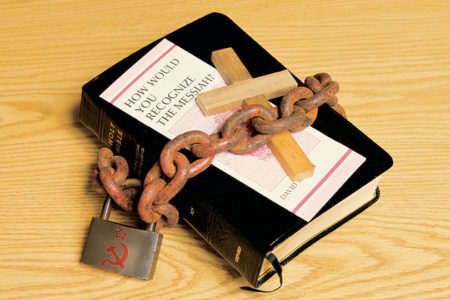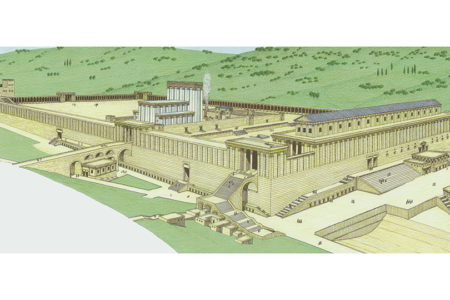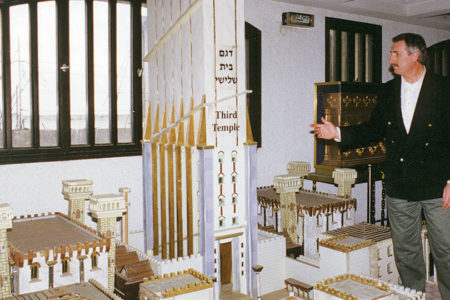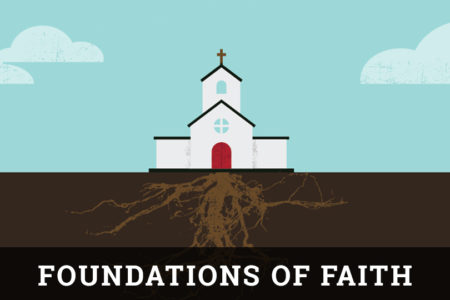Zvi Dec/Jan 1997/1998
For a long time, the debate in Israel about “Who is a proper Jew?” was quiet. Now, in recent months, it has begun to rage again. Every religious group is trying to make proselytes to their form of Judaism and have people follow their particular beliefs and customs. And, as always seems to be the case in religious matters in this land, the group with the most ancient roots has the most power. In this debate, the Bible, God’s holy Word, has no value. Rather, the various groups tout the writings of their famous rabbis and hold them to be the truth. I view this ongoing struggle and wonder, are we the people to whom the Lord said, “Thou art my servant, O Israel, in whom I will be glorified” (Isa. 49:3)?
I often go to the rabbis—the ones who are so sure of themselves, who think they are such good servants of God when, in fact, they are far removed from Him. I read that verse and ask them, “With what do you glorify the Lord? With your traditional rabbinic Halacha (law)? With all your many customs, which are worthless? You believe false teachings, and, what’s worse, you want to pass them on to the people of Israel, expecting them to accept them as the truth of God.”
One rabbi in a religious school I was visiting brought out several thick books, covered with dust and filled with thousands of fictitious stories and superstitions. “This is the truth,” he said, “If you knew everything contained in these books, you would not come here and ask silly questions about faith.” And who was the one who made this grand statement? A famous teacher in this great rabbinical seminary. His pupils were listening and seemed very proud that he had spoken so authoritatively to me. They have such confidence in him, but it is blind confidence. They were so sure that he had won a great victory, but as we say here in Israel, “One more victory like that and they are lost.”
I said to the rabbi and his pupils, “I have not come here to play your game, to see who knows more. I have come to fulfill my duty before the Lord and to bring you what He wants you to hear—the truth. You have not shown me the truth. Everything in your dusty old books is false. You are doing the same thing our forefathers did in the wilderness when they danced around the golden calf.”
My words were not welcome to their ears, and they appeared to be very suspicious of me. Of course, as always, they wanted to know more about me. The rabbi asked, “Who do you think you are? And who are we in your eyes?” I had been waiting a long time to hear such a question. As you know, in Israel we cannot enter a witnessing situation like a big wind blowing in. As it is written in 2 Timothy 2:24, as servants of the Lord we must be patient. But when they open the door, I am happy to walk through it.
I immediately thought of Isaiah 53:6 and read it to them: “All we like sheep have gone astray; we have turned every one to his own way, and the Lᴏʀᴅ hath laid on him the iniquity of us all.” As I read the last portion of the verse, I could see looks of curiosity creep across their faces. One of the students asked, “How did you come to such a conclusion?” I replied, “This is not my conclusion. It is a fact. Because I believe in the living God and do not follow idols, He has given me the discernment to understand His Word. I do not simply read it or recite it by rote without knowing what it means. Not one of you can say that God’s holy Word is not true. Nor can you make a new Halacha surrounding it. God’s Word stands alone.”
Another student asked, “Do you belong to the Reform group whose members call themselves ‘right Jews’?” I replied, “I belong to a group whose members believe in God according to the way He has prescribed in His holy Word. We do the best we can, with all our human frailties, to obey His commandments and bring His truth to others. No fictitious stories, no superstitions—just the truth of God’s Word in black and white. The Lord has said, ‘Thou art my servant, O Israel,’ and I try to be the best servant I can.”
After a brief pause came another question: “Are you truly a Jew?” I replied, “Yes I am. But everyone who obeys the commands of God is His servant.” Then I asked, “Do you call yourselves Jews?” They became indignant, and the rabbi said, “You are here in our synagogue, our holy place. How can you ask us such a question?” I replied, “For whom is this place holy? The Scriptures say that the holy place was in the Temple of God, but that was destroyed long ago.” The rabbi said, “That was history. We are talking about religion.” “Aha!” I said. “That is your big mistake. You follow all your old traditions—all the trappings of religion—but you are far away from the true God.” I then pulled out my small Bible and told them, “This is the only book I believe. If you have something against me, show me what I have done wrong from this book and no other.”
When the rabbi looked at the Bible, he exclaimed, “Just as I thought! It contains the New Testament, which speaks about that man. I cannot read the New Testament, and I do not permit my pupils to read it either.” I then told him, “The Old Testament also clearly speaks about the one whom you call ‘that man.’ His name is Yeshua Hamashiah [Jesus Christ].” I began to point out to them many Old Testament passages that speak about Jesus Christ, our Lord and Savior, and the rabbi and his pupils became very quiet and listened intently as I read them.
When I left the rabbinical seminary that day, I felt that I had indeed sown the seed of the gospel. Please pray with me that some of the seed may have fallen on good ground and that some of the pupils—perhaps even the rabbi himself—will one day recognize Jesus Christ as Israel’s Messiah and the Savior of the world.







